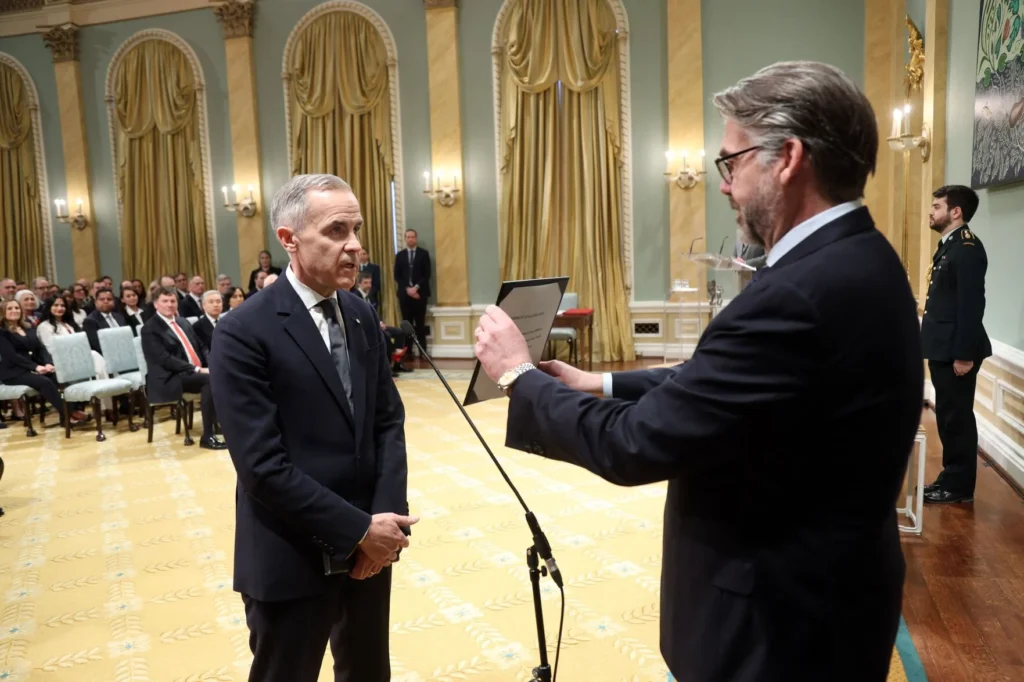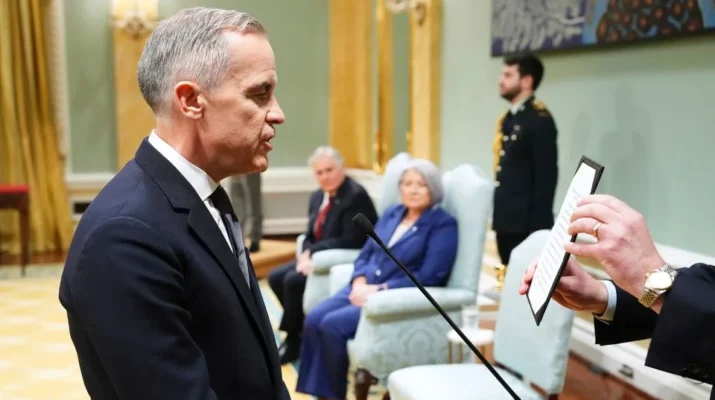By M Khaidar Khamzah
Khamzah is currently a student at the University of Toronto, majoring in Economics with a specialization in International Affairs and a minor in Political Science. He is also a freelance writer, focusing on global economic trends and their impact on international relations.

Can the outsider Prime Minister navigate Canada’s growing geopolitical tensions and economic Challenges?
Mark Carney’s recent swearing-in as Canada’s Prime Minister marks a pivotal moment in the country’s political history. Stepping into the role following the resignation of Justin Trudeau, Carney, a former central banker with an extensive global career, brings with him a unique set of skills, and a fresh approach, at a time when Canada faces mounting pressures both domestically and on the world stage. However, the question remains: can an outsider, with no prior political office in Canada, successfully lead a nation through its most critical challenges?
From his first moments in office, Carney signaled a shift in tone and policy direction. His defiant remarks rejecting U.S. President Donald Trump’s repeated insinuations that Canada should become the 51st state—“We will never, ever, in any way, shape or form, be part of the United States”—reflect his commitment to protecting Canadian sovereignty in an increasingly unpredictable geopolitical environment. These words were more than just a rebuttal to Trump’s provocations; they were a declaration of intent, demonstrating Carney’s willingness to defend Canada’s national identity.
Yet, as Carney navigates the complex world of global trade disputes and growing protectionism, his ability to balance assertive foreign policy with sound economic leadership will be put to the test. Canada’s relationship with the United States—its largest trading partner—has become increasingly strained under Trump’s administration. A trade war looms on the horizon, and Carney’s experience as a former governor of both the Bank of Canada and the Bank of England will be instrumental in safeguarding Canadian interests. However, Carney must ensure that his economic expertise translates into effective political governance, particularly as he faces the challenge of uniting a country divided along political, cultural, and regional lines.
Carney’s outsider status—having never held a seat in Parliament—means that his leadership will be scrutinized under a different lens. While his extensive financial experience equips him with the tools to handle crises, political leadership demands more than expertise. Can Carney inspire trust among Canadians who have grown weary of traditional politics? Can he address the complex social and economic issues facing the country, from growing income inequality to the housing crisis? These are questions that will define his tenure.
One of Carney’s key priorities is clear: he aims to protect Canadian workers and families in the face of foreign trade actions and ensure economic growth by reducing government spending. His proposals to invest in infrastructure, particularly in building millions of homes, are crucial to addressing the country’s affordability crisis. But the question remains—can he deliver on these promises? His ability to navigate Canada’s trade relations with the U.S. and ensure the economy continues to grow in an era of uncertainty will ultimately determine whether he succeeds or falters.
Impact on Indonesia’s Economy and Global Positioning
Mark Carney’s leadership in Canada could have significant implications for Indonesia, especially in the context of global trade and economic cooperation. As an emerging power in Southeast Asia, Indonesia’s economy is increasingly interlinked with global markets, and Carney’s approach to international trade and economic policy could influence Indonesia’s own strategies.
For one, Carney’s emphasis on reducing government spending and investing in infrastructure to address housing shortages is a principle that resonates with Indonesia’s ongoing efforts to boost economic growth and development. With an ambitious plan to build millions of homes, Indonesia could find inspiration in Carney’s policies as it seeks to address its own challenges related to housing affordability, urbanization, and social inequality. The implementation of infrastructure projects in Canada may also present an opportunity for Indonesian companies and contractors to engage in new trade and investment partnerships.
Furthermore, Carney’s firm stance on protecting national sovereignty in the face of foreign pressures could have a ripple effect on Southeast Asia, where countries like Indonesia must balance their relationships with global powers. As global tensions rise, especially with the growing influence of China, Indonesia may find Carney’s leadership approach valuable in defending its national interests while maintaining strong trade relationships with key international partners, including the United States.
Carney’s foreign policy and trade strategies may also offer insights for Indonesia, which is focused on enhancing its position in the global economy. As Indonesia continues to assert itself in regional and international diplomacy, Carney’s balanced approach to both protecting domestic industries and fostering international cooperation could inform the way Indonesia navigates its own trade relations and global positioning.
The upcoming federal election, which Carney must call before October 20, 2025, will be a defining moment for the Prime Minister. It will test not only his political legitimacy but also the Canadian public’s willingness to embrace a new form of leadership. Will Canadians be ready to back an outsider with a clear vision for the country’s future, or will they favor the status quo?
As Carney takes the reins of Canadian leadership, the future of the country is uncertain—but one thing is clear: he will not follow the traditional path of his predecessors. In a world where global power dynamics are shifting and political institutions are under scrutiny, Carney’s rise offers a fresh opportunity for Canada to chart a new course—one defined by pragmatism, independence, and economic stewardship. Whether he will succeed, however, remains to be seen.
References:
Carney, Mark. “Remarks on Canadian Sovereignty,” The Globe and Mail, March 2025.
Trump, Donald. “Canada Should Be the 51st State,” Fox News, January 2025.

